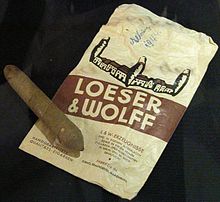Reprehensible & Wolff (novel)


Tadellöser & Wolff is a novel by Walter Kempowski in which the author processes memories of his childhood and youth between 1938 and 1945. The work was published in 1971 and forms the fourth part of the Deutsche Chronik .
action
Walter Kempowski grew up with his parents and two siblings, Ulla seven years older and Robert six years older, in Rostock . His father Karl is a World War I veteran and shipowner, his mother Grete a housewife.
At the beginning the family moves within Rostock; the family members as well as the neighbors Woldemann, with daughter Ute, and the house owner Krause are introduced. On his way to school, Walter sees that the synagogue was destroyed in the pogrom of November 9, 1938. He goes with the pimp; his brother Robert is interested in girls and American music. You go on vacation in the Harz Mountains. After the outbreak of the Second World War , his father was drafted into the army (1941) and sent to France. The air raids on Rostock begin in 1942, but the Kempowski's apartment is spared except for broken glass. A young Dane, Sven Sörensen, who works in his father's shipping company, is arrested and interrogated by the Gestapo for drawing the houses destroyed by bombs on a city map. Grete Kempowski stood up for him and obtained his release. The description of the tutoring with Aunt Anna (= Mrs. Kröger) takes up a lot of space; Walter becomes horde leader in the Hitler Youth. Ulla is studying English; Sörensen makes clear a Dane's critical view of Germany, he is wooing Ulla. Sörensen later marries Walter's sister Ulla and moves with her to Copenhagen .
Walter repeatedly comes into conflict with the Hitler Youth ; For example, he refuses to cut his hair short and keeps inventing new excuses not to have to wear the Hitler Youth uniform. Towards the end of the war, Walter was drafted into a punishment unit of the Hitler Youth and worked as a courier for the Wehrmacht . An assignment takes him to Berlin , which he can leave immediately before the Red Army invades. After returning to Rostock, the mother did not take the opportunity to flee on a steamer, but decided to wait for her husband to return from the front. In the last scene of the book, Walter is sitting on the balcony with his mother and awaiting the arrival of the Soviet soldiers.
reception
In the book, the name Auschwitz only comes up in connection with a newspaper article about a bloody marriage drama on the street. Kempowski was accused by contemporary critics of staging naivety in a “perfidious” way at this point. Kempowski himself wrote in Sirius that he had mentioned Auschwitz in order to prevent German self-pity in view of the air raids on Hamburg discussed in the book and to remind the reader of "what was happening in the East at the same time".
filming
The ZDF filmed the novel in 1975 as a TV movie in two parts . Directed by Eberhard Fechner .
Individual evidence
- ^ Sascha Feuchert and Andreas Pfeifer: Married drama in Auschwitz. In: Frankfurter Allgemeine Zeitung. November 4, 2008, accessed January 5, 2013 .
Web links
- Extended job comments (May 2020) on "Tadellöser & Wolff" https://kempowski-archiv-rostock.de/files/kommentare/TW%20Okt.%202019%20Rostock.pdf by Lars Bardram on the Kempowski-Archiv-Rostock website - A bourgeois house (PDF file).
- Figure lexicon for Tadellöser & Wolff by Eva D. Becker in the portal Literaturlexikon online
